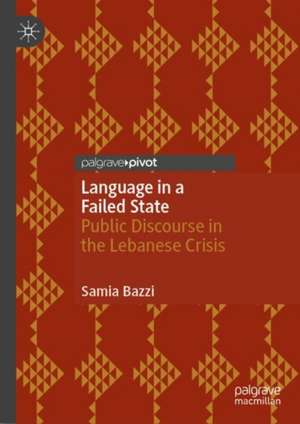Language in a Failed State: Public Discourse in the Lebanese Crisis
Autor Samia Bazzien Limba Engleză Hardback – 23 dec 2024
Preț: 280.69 lei
Nou
Puncte Express: 421
Preț estimativ în valută:
53.71€ • 57.43$ • 44.78£
53.71€ • 57.43$ • 44.78£
Carte disponibilă
Livrare economică 27 martie-10 aprilie
Livrare express 13-19 martie pentru 30.58 lei
Preluare comenzi: 021 569.72.76
Specificații
ISBN-13: 9783031669996
ISBN-10: 3031669991
Pagini: 144
Ilustrații: Approx. 145 p. 9 illus.
Dimensiuni: 155 x 235 x 16 mm
Greutate: 0.35 kg
Ediția:2025
Editura: Springer Nature Switzerland
Colecția Palgrave Macmillan
Locul publicării:Cham, Switzerland
ISBN-10: 3031669991
Pagini: 144
Ilustrații: Approx. 145 p. 9 illus.
Dimensiuni: 155 x 235 x 16 mm
Greutate: 0.35 kg
Ediția:2025
Editura: Springer Nature Switzerland
Colecția Palgrave Macmillan
Locul publicării:Cham, Switzerland
Cuprins
.- Chapter 1: Introduction.
.- Chapter 2: Why has Lebanon become a failing state?.
.- Chapter 3: How can a CDA approach contribute to the study of state failure?.
.- Chapter 4: How does the act of coining words and expressions help in the manufacture of failure?.
.- Chapter 5: Measuring social cohesion in a failed state through the citizenry’s own evaluation and speech acts.
.- Chapter 6: How is a failed state perceived by its citizenry? A study of the metaphors that reveal these perceptions.
.- Chapter 7: Conclusions.
.- Chapter 2: Why has Lebanon become a failing state?.
.- Chapter 3: How can a CDA approach contribute to the study of state failure?.
.- Chapter 4: How does the act of coining words and expressions help in the manufacture of failure?.
.- Chapter 5: Measuring social cohesion in a failed state through the citizenry’s own evaluation and speech acts.
.- Chapter 6: How is a failed state perceived by its citizenry? A study of the metaphors that reveal these perceptions.
.- Chapter 7: Conclusions.
Notă biografică
Samia Bazzi is Professor of Translation and Linguistics at the Centre for Languages and Translation, Lebanese University, Beirut. She has published extensively on political discourse and journalistic translation, analysing the links between language and politics using Critical Discourse Analysis. Her key publications include Arab News and Conflict (John Benjamins, 2009).
Textul de pe ultima copertă
This book examines public, political and media discourse in the context of failed states using Lebanon, a country torn by wars and political-financial corruption, as a contemporary case study. Using critical discourse analysis (CDA), the author brings political and economic theories into dialogue with socio-linguistics to argue that public discourse in a failed state not only plays a role in that collapse but is a key presenting symptom of social disintegration. Through CDA, the book makes this phenomenon visible, and contributes to existing definitions of the concept “failed” or “fragile” state. In addition, the qualitative data and analysis provided offer a tool to assess a state’s vulnerability to collapse. The book also expands the sociolinguistic model to eavesdrop on the zeitgeist of the nation in order to examine the degrees of social cohesion, sectarianism and bonding. This book will be of interest to discourse analysts, journalists, politicians, policy-makers, and economists.
Samia Bazzi is Professor of Translation and Linguistics at the Centre for Languages and Translation, Lebanese University, Beirut. She has published extensively on political discourse and journalistic translation, analysing the links between language and politics using Critical Discourse Analysis. Her key publications include Arab News and Conflict (John Benjamins, 2009).
Samia Bazzi is Professor of Translation and Linguistics at the Centre for Languages and Translation, Lebanese University, Beirut. She has published extensively on political discourse and journalistic translation, analysing the links between language and politics using Critical Discourse Analysis. Her key publications include Arab News and Conflict (John Benjamins, 2009).
Caracteristici
Examines the concept of a “failed state” from an academic standpoint, relating it to the status quo in Lebanon Undertakes a socio-linguistic investigative study of a type of discourse that is exclusively exchanged in a failed state Demonstrates how such discourse may be both an indicator of and a collaborator in the state’s collapse
